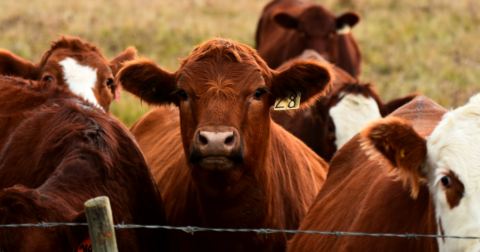Explainer
How Overconsumption Affects the Environment and Health, Explained
Climate•12 min read
Reported
New rules aim to crack down on greenwashing, and for once meat and dairy are not exempt.


Words by Sophie Kevany
Misleading and unsubstantiated environmental claims that include suggestions of happy cows, chickens or pigs on food and other consumer products could be banned in the European Union under a new law. The new rules are aimed at ending the use of unsubstantiated environmental claims like green, net zero, climate neutral, carbon neutral or eco-friendly on any consumer product — including meat, eggs and dairy — but empty welfare claims could be a target too. The rules, passed last week by EU lawmakers, are expected to take effect sometime in 2026 or later in some countries.
Although not directly aimed at animal welfare claims or images, if these are included as part of an overall sustainability claim, then the EU’s new rules would apply, says Nusa Urbancic, CEO of Changing Markets Foundation, an NGO. “So, for example, if you say this is ‘responsible chicken’ and if it was in a green and brown package, then [the producer] would need to substantiate the animal welfare of that chicken [using an approved, independent certifier].”
A European Commission spokesperson did not answer questions about how the new rules might intersect with animal welfare claims or images. They did, however, say assertions that would run afoul of the new law include “vague environmental claims … such as climate-friendly beef, if they cannot demonstrate excellent environmental performance.” Climate neutral milk, based on “greenhouse gas offsetting projects outside the product’s value chain” is another no-no. The new rules require that environmental “commitments and targets” be “clear, objective, publicly available and verifiable,” and producers must lay out a “detailed and realistic implementation plan that shows how those commitments and targets will be achieved” and allocate resources for that.
The food sector is well known for its greenwashing, Urbancic says. “Our investigation Feeding Us Greenwash showed that climate claims were very prevalent in the sector, representing over 80 percent of greenwashing on food.” But until the new law is adopted and applied by the different EU nations, it will be hard to judge its success.
“Some greenwashing from the [animal protein sector] will indeed fall under the new rules and could be struck down by authorities without the need for further investigation,” says Margaux Le Gallou of the Environmental Coalition on Standards, an EU NGO. For example, a generic claim such as “our meat is good for the planet” would likely infringe the new rules, she says, without any further need for investigation.
Cases where a company provides some form of substantiation are trickier. “Authorities would have to get a closer look, and unless there are some national rules, they might not be equipped to say whether the substantiation is good enough.” As an example, Le Gallou says, imagine a company claims to have halved emissions over the past two years, and publishes a report detailing the calculations. Under the new rule, national authorities would have to check the report before deciding whether or not to allow the claim.
Just how rigorous the oversight will be remains to be seen. For instance, could a meat company label beef from cows fed seaweed as 80 percent lower in emissions — based on a study measuring methane reductions in cows only during their time spent on feedlot? In that case, would omitting information count as misleading? That’s exactly how a number of news outlets reported on seaweed additives — repeating the 80 percent figure — when more accurate calculations that take into account the entire lifecycle of the cow, including time on pasture when cows burp the most methane, put the figure at more like 8.8 percent, according to calculations estimated by Matthew Hayek and Jan Dutkiewicz in a 2021 essay for Wired.
How many, and how often, claims are checked will matter too.“ If market surveillance is low [a company might] hope to pass unchecked,” says Le Gallou.
And while unsubstantiated images suggesting a product is green or environmentally friendly are targeted in the new rules, the reality of how pictures of happy animals will be policed is less clear and made harder by the European Commission’s recent failure, blamed by many on meat industry lobbying, to update and improve animal welfare laws, including product labeling.
“I know that green imagery was specifically targeted” in the new rules, and that “other imagery linked with animal wellness could be included,” said Le Gallou. But “we need to wait for transposition in national law, or guidance from the European Commission, to see if they give more information.” Failing that, she says, “we will have to wait for legal cases or decisions from consumer authorities. I would not expect a wide-ranging impact before any company gets into trouble with authorities.”
Another factor, say Le Gallou and Urbancic, is how a second complementary set of rules, known as Green Claims, progresses. “My feeling is [the new rules] will cut down on climate greenwashing, but for the details of what kind of claims companies can make and what methodology they have to use, we will have to wait for national implementation and the adoption of the green claims directive next year,” Urbancic says.
Asked how the new directive might affect his independently certified, higher welfare, carbon neutral eggs, Ruud Zanders, co-founder of Kipster said he did not know yet.
“We have an independent certifier for animal welfare that works in the Netherlands, but I don’t know if it is certified at EU level. And for carbon emissions: we do the calculations by ourselves and it is reviewed by the Blonk Environment Agency.” Though based in the Netherlands, Kipster also sells eggs in America.
The lack of an EU-wide animal welfare certification scheme, suggesting that a patchwork of different national certification standards might evolve, is an additional complication. “Apart from the organic label, which does include some animal welfare features, although still not optimal, there is no label at EU level that certifies, solely, the welfare of animals,” says Camilla Björkbom, food policy advisor with Eurogroup for Animals, an NGO.
If an EU welfare labeling scheme is created, she adds, it should cover the entire lifespan of the animal, not a moment in time, even a good one. “Images of ‘happy animals’ are misleading. The only transparent and objective consumer label on animal welfare would be the use of an enhanced method of production label that covers the entire lifespan of the animal, including transport and slaughter.”
Copa-Cogeca, the EU’s leading farming organization, did not respond to Sentient Media’s request for comment.